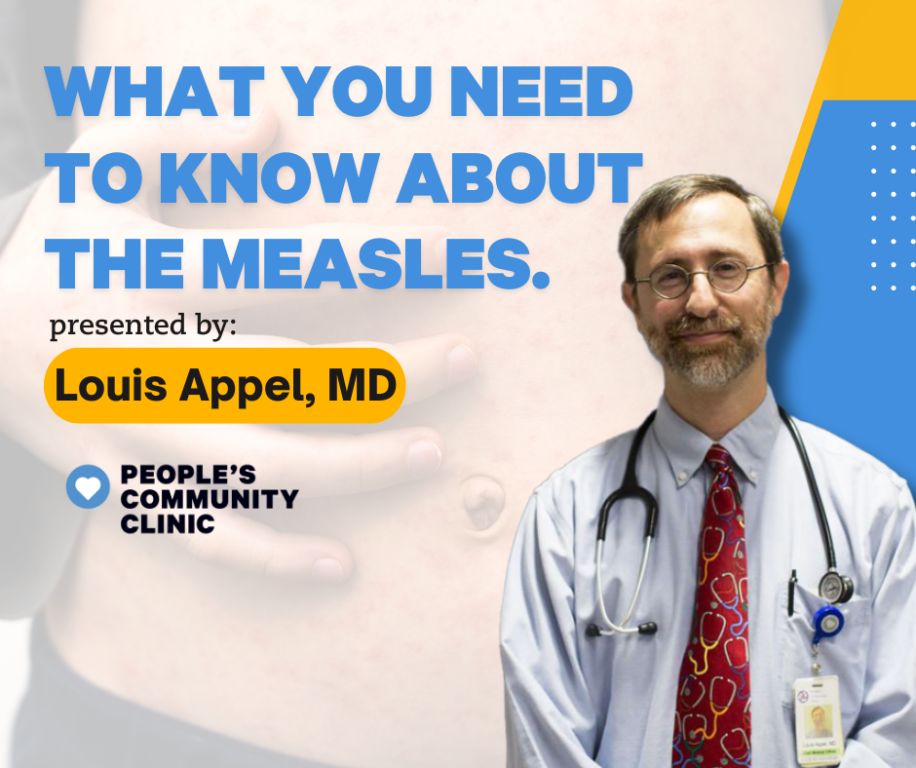Measles Outbreak in Texas: What You Need to Know to Stay Protected
Please visit our YouTube Channel to see the video.
Por favor, visite el canal de YouTube de People’s para ver el video.
A significant measles outbreak is currently affecting parts of Texas, particularly in the West Texas and southern plains regions. As cases rise, many individuals are understandably asking: Am I protected?
To help answer this important question, Dr. Louis Appel, Director of Pediatrics at People’s Community Clinic, offers expert guidance on protecting yourself and your loved ones during this outbreak. Here’s what you need to know.
Who Needs the Measles Vaccine?
If you were born before 1957, it’s generally assumed you’re immune to measles because of natural exposure during that time period. However, if you were born in 1957 or later, you should be vaccinated.
Children should receive two doses of the MMR (measles, mumps, rubella) vaccine—first at 12–15 months old and again at 4–6 years old. Adults should ensure they’ve had at least one dose and in some cases, two.
Not Sure About Your Vaccination Status?
If you’re uncertain whether you’ve been vaccinated, check your medical records or speak with your healthcare provider. They can help assess your history and determine the best course of action. Sometimes, a blood test can check for immunity, or you can get vaccinated—an extra dose won’t cause harm.
How Does Measles Spread—and What Are the Symptoms?
Measles is one of the most contagious viruses. It spreads through airborne respiratory droplets and can linger in the air for up to two hours after an infected person has left a room. That means you don’t need to have direct contact to catch it.
Early symptoms include:
• Fever
• Cough
• Runny nose
• Conjunctivitis (red or pink eye)
• A rash that typically appears a few days later
Importantly, people with measles are contagious up to four days before the rash appears and four days after—making it easy for the virus to spread before it’s even recognized.
What Should You Do if You Suspect Measles?
Call your healthcare provider before heading to a clinic or emergency room if you believe you may have measles. They may provide special instructions to avoid exposing others, such as waiting outside or entering through a separate entrance.
Is the Vaccine Safe and Effective?
Yes. The MMR vaccine is highly effective—about 93% after the first dose and 97% after the second. Like all medical treatments, it can cause mild side effects (such as fever or soreness at the injection site), but serious reactions are rare.
Concerns about a connection between the MMR vaccine and autism have been thoroughly debunked. Extensive studies have found no link between the vaccine and autism.
Why Vaccination Matters
While most people recover from measles, the illness can lead to serious complications, especially in young children. These include ear infections, pneumonia, brain swelling (encephalitis), and, in rare cases, death. The vaccine is our best defense.
Stay informed and protected.
As this outbreak unfolds, ensuring your vaccination status is current is more important than ever. Your healthcare provider is your best resource if you’re unsure or have questions. You can also leave your questions in the comments; we’ll do our best to help.
Vaccination isn’t just about personal protection—it’s about community health. Don’t wait. Take action today.
People’s Community Clinic is here to support you with accurate information and trusted care. Contact 512.478.4939 for more information.

